- Home
- Patricia Wynn
Mistletoe and Mischief Page 5
Mistletoe and Mischief Read online
Page 5
Charles collected himself. Then, with a deep sigh, he related his meeting with Louisa—leaving out her name, of course, and abbreviating most of his thoughts. He told Ned about the letter he had sent to her guardian.
Ned listened, most surprisingly, without interrupting, and only laughed when told of the reception they had got at The Crown and Pear when they used his name.
“Good people, the Spadgers,” he said, “but they haven't got any love for me. I put up a lady friend there once, the prettiest little ladybird you ever saw, and that put them out. Took it out on you, did they?"
“And on Miss—the young lady I am escorting,” Charles said, catching himself. “But I must say she charmed them into keeping her for the moment. What we need is—"
“Pretty is she?"
“What?"
“This friend of yours. Is she pretty?"
Charles felt himself colouring, a touch of anger mixed with his embarrassment. “I would say she is quite attractive, if you must know, though I find the colour of her hair somewhat objectionable. But what has that to say to anything? You must not have been listening to me if you think it has."
“Why, dear boy, it has everything to say! If you need a place to stay, you must bring her here and at once!"
Charles frowned at him. “Not on your life, Ned. And I will thank you to keep away from her. That is not why I've come to you for assistance."
Ned shrugged philosophically. “No harm in trying. Very well, why have you come?"
“I need a female, that's why."
“Another one, Charlie? My, you have turned wild."
Charles sighed with little control. “Someone to act as companion, Ned. Don't be so crass."
Ned rose and came over to fill his glass again. “If it were me, I'd say you had all the company you need, dear boy. But if it's respectability you want, I can provide it for you.” He raised his own cup in a toast. “I'll give you Miss Wadsdale for a Christmas present—with a ribbon round her, if you wish."
“Is she your mother's companion?"
Ned nodded, raising his eyes to the ceiling expressively, “She is,” he said. “And I'd be grateful to you if you'd take her off my hands for the holidays. It's boring enough around here with m’ mother and sister, without having to suffer from her gibble-gabble.” He lifted his glass again. “Argle-bargle, if you prefer."
Charles ignored his impudence and began to relax with relief. “Thank goodness,” he said, and allowed himself for once to enjoy his cognac. The golden liquid burned his throat and soothed him simultaneously. “I'll take her gladly. Can I have her tonight?"
Ned smiled again, but kept the joke to himself. “You could if it were up to me,” he said. “But I'll have to do some talking to wean her away from m’ mother. You're a marquess-she'll like that. But she's not very amenable to change, so I won't be able to bring her to the mark that fast."
“Tomorrow, then. At dawn."
“Hold on there, boy! You could probably have her tomorrow, but what will you do with her if she comes?"
Charles drew his brows together. “As soon as she's comfortable, we'll set out immediately for London, of course."
Ned shook his head. “Tomorrow's Sunday have you forgotten? And you in the government."
Charles closed his eyes. He had forgotten the day. Of course they could not travel on Sunday. Not unless they could do so without being caught.
He looked questioningly at his host. Ned shook his head again. “Not on your life, Charles boy. Miss Wadsdale's pious. And if the Spadgers didn't inform on you, she would do so herself. Turn herself in to the magistrate, she would, rather than break the Sabbath."
“Oh, damn,” Charles said. He leaned his elbows on his knees and sighed. “Well, it can't be helped, I suppose. I'll have to come for her on Monday."
“Right,” Ned said, downing the contents of his glass in celebration.
Charles said anxiously, “You won't forget, will you? I need you to come through for me on this."
Ned eyed him mockingly. “Don't worry, Charlie boy. I'm just drunk, not weak in the head. My memory serves me well enough.” His grin turned mischievous. “For instance, I haven't forgotten the time you had the nude portrait delivered to the English master during class. I'll never forget his face."
Taken aback for a moment, Charles realized he had almost forgotten those days. He grinned, too, and then grimaced ruefully. “That wasn't me. That was just me under your influence."
“At least you had some friends then."
Charles pursed his lips. “I have friends now, thank you. Just not much time to see them in, that's all. I'd best be going."
He put down his glass and stood. Then he remembered something. “Lou—the young lady left her baggage in Gretna Green. How should I go about finding her some clothes?"
Ned cocked an eye. “If it were me, Charlie boy, I—''
Charles nodded and sighed. “You should do better without the clothes, I know. But listen, Ned, will you stop playing these stupid games! And will you leave off with that abominable nickname!"
“Sorry, Wroxton. Old habit.” His smile was unrepentant.
Charles's lips curved. “0h—go drown yourself! What about the clothes?"
Ned put down his glass. “As it happens, you've come to the right place. Has she a good figure, this Miss Lou—?” He waited unsuccessfully for more.
Charles's cheeks grew warm. “I suppose this question is pertinent?"
“But of course it is, Charles!” Ned widened his eyes in innocence. “Can you doubt me? I need to know if my sister's clothes will fit her."
“Your sister's? But won't Miss Conisbrough mind?"
“She's not here,” Ned said. “And not due back for three days, at least."
Charles still looked doubtful, so Ned added, “I'll explain it to her myself when she gets here."
“Without embellishment, I hope. And you might leave my name out of it."
“Of course, dear boy. Soul of discretion. You can count on me. Meanwhile, I need a description of the young lady, please. From what you said about her hair, I deduce it is red."
“Quite. But what has that got to do with her size?"
“We're getting there. Be patient. But you wouldn't want the colour of her gowns to clash, would you? What about eye colour?"
“Blue.” Charles could not believe that Louisa would be too particular about the colour of her clothes under these circumstances. But Ned knew women better than he did.
Ned smiled appreciatively. “I'm getting a picture. Now about the figure. Slender or plump?"
Charles began to squirm. “Slender, I should say. Medium stature."
“Good. That sounds a bit like my sister. Unless the bosom—what would you say about her dairy?"
Charles exploded. “Really, Ned! This is a lady we're discussing!"
Ned raised both hands in defense. “Remember the clothes, dear boy. You want them to fit.” He lowered them then and said in a reasonable tone, “But I can understand your reluctance to be specific ... especially if the young lady's form is better left undescribed. You always were the gentleman. I'll simply take it, then, that she's rather unwieldy, shall we say—"
“Damn it, Ned! There is nothing about Miss Davenport's figure that is in the least unwieldy! In fact, I would put her up against any of those ladybirds you're so fond of talking about!"
A satisfied smile broke over Ned's countenance. When he saw it, Charles gave a groan.
“Miss Davenport,” said Ned, rolling the name on his tongue. “Miss Louisa Davenport, I believe you said."
Charles buried his face in his hands. “So help me, Ned -''
“Can't say that I know her. But that's neither here nor there, I suppose."
Charles took a deep breath. Then he managed to continue, “So help me, Ned, if I hear one word of rumour in connection with her name, I shall come after you. Career or not, I'll run you through before I'll let you start the slightest scandal about her."
“Ver
y proper, Charles. I should feel the same way in your shoes.” Ned's tone sobered slightly. “But I'm only a bit of a rake, you know. Not a blackguard. The lady's name is safe with me.
“But—” the teasing note was back “—I'm glad you've noticed all you have noticed, though. It tells me you're not quite the dry stick I thought you'd become. My advice is, take advantage of the situation. Nothing illegal, mind, but do enjoy yourself. “Now—” Ned sprang to his feet before Charles could lodge another protest. “I'll go tell my sister's maid to pack those clothes."
He left Charles alone in the library feeling wrung out by the shifts his emotions had undergone during the past half hour. More than a moment passed before Charles could decide whether he had been wise to come. But after he reflected, he determined that Ned's intentions were basically good. It would have been remarkable indeed if he had not taken the chance to avenge himself for Charles's past snubs, and the small bit of teasing to which Charles had been subjected was as nothing compared to the assistance Ned was giving him.
He would have to remember Ned, Charles decided. Rake or not, Ned had proved to be a true friend when he needed one.
When Ned came back, he was accompanied by a maid carrying two portmanteaus. The contents would be far more than Miss Davenport could possibly need, Charles reflected. At least, he thought so. But Ned seemed to take particular joy in supplying him with the clothes. And there was little Charles could say about them in front of the maid.
“Now,” Ned said, putting his arm about her. “You've heard what I said, Mary. Not a word to anyone about this—even to my sister. We must protect Lord Wroxton's reputation."
As the maid giggled, Charles swelled with suppressed indignation.
“Yessir, your lordship. I'll not breathe a word,” she said, giving Charles a roguish look.
After this, Charles escaped as soon as he could. He was relieved to be away from Ned and his mocking laughter.
But on the way back to the inn, he reflected that the visit had not been so bad, after all. He chuckled a bit when he remembered that episode at school with the portrait. Funny that he had forgotten.
The fire from Ned's cognac, and an occasional laugh over one of Ned's outrageous remarks, warmed him as he made his way back to The Crown and Pear.
Chapter Four
Louisa had every intention of staying out of mischief while Charles was gone.
She knew how dreadfully she had imposed on his kindness, and she meant to see that his reputation came to no harm because of her. The truth was that the notion of forcing herself on a stranger was as distasteful to her as it was to Charles. But she was not one to shrink from what was necessary.
When she had seen Charles standing alone in the falling snow, an impatient frown on his lean, sensitive face, she knew her chance had come. Then she overheard the ostlers talking behind her in the stables. It needed only for one to mention that Charles was a marquess for her to be certain she could do no better in her choice of saviour.
And indeed, she thought as she sat in the Spadgers’ parlour, she had done very well. Aside from his tendency to be a little stiff with her at first-for which she could not, in justice, blame him-Charles had proven to be all concern for her comfort. Just the thought of his riding out on this cold night to obtain a chaperone for her made her heart swell with gratitude. She was sorry he had to venture out in such dismal weather. But Louisa was not one to exaggerate the dangers of such a mission. She simply hoped his headache would not recur.
In an endeavour not to be the cause of such an affliction, she determined she would sit quietly without entertainment, ready to order a punch for him on his return. She had no sewing to occupy her hands, and she preferred to wait to dine with Charles. The Spadgers, quite naturally, had nothing on hand for her to read.
The clock outside in the hall ticked monotonously. After a good half hour of sitting with her hands in her lap, Louisa began to fidget. She decided it would do no harm for her to draw a chair up to the window. That way she could look out on the snow, if nothing else; she might even see Charles returning before the Spadgers did, so she could alert them to his arrival.
She found she was most anxious for Charles's comfort. Even she, with her little knowledge of men, could tell how strained he had been when she first met him. She suspected he had a regrettable tendency to overwork.
She crossed the room and pulled a different chair to a spot before the window. Heavy curtains shrouded the glass to block draughts. Louisa parted them just enough to peer out. The snow had started to fall again, but not so heavily that she had any fears for their departure on the morrow. By the light from the inn's lanterns, she could see that the coating on the ground was much too thin and the snow much too fine for there to be any danger of their bogging down on the road.
Just then, a wrenching howl cut into the silence, followed by a canine whimper and a yip. Louisa jumped, then wiped the fog off the glass with her glove and strained to see farther into the yard.
This corner of the parlour faced the road. Dim light shone from the Spadgers’ lamp, casting a beam in the shape of a wedge out onto the pavement.
At first, Louisa saw nothing. She was about to wipe the pane again when something in the shadows caught her eye. She pressed her face to the window just as another howl of pain echoed down the street. Some creature was evidently in torment.
Louisa spat on her fingers this time and wiped the pane again to keep it clear. Then she saw a figure move into the lantern light—a man with a dog, small like a puppy, that he was holding by the ears.
Before the next wail of pain reached her, Louisa had bolted from her seat and flown to the door. She threw it open to find Sammy Spadger on the point of knocking.
Her demeanour frightened him. “What is't, lass?"
“Oh, Mr. Spadger, come quickly! I've no time to explain, but you are needed!"
Louisa did not wait to see if he followed. Without so much as her spencer-which she had removed so Mrs. Spadger could press it-she headed out the main inn door and into the street beyond.
“Miss! But, miss-!"
Sammy Spadger grabbed a lantern and came running after her, the words “catch thy death” and “dampen thy slippers” tripping off his tongue.
But Louisa was so heated by what she had just seen that no amount of snow could chill her. She stalked up to the man still standing on the pavement-a heavyset man with a stale smell of alcohol about him-and snatched the dog from his arms.
“0h, how could you! You scoundrel!"
When he saw who had accosted him, the man's first startled glance quickly changed to one of furtive belligerence.
“'Ere now! Wot you doin'?"
Louisa ignored him. She hugged the puppy close to her while the frightened creature huddled in her arms and whimpered. Seeming to sense a sympathetic spirit, it snuggled closer to her for warmth until Louisa felt a cold, wet nose planted between her breasts. A shock of long silky fur tickled her on the chin.
“Miss?” Sammy Spadger was hovering anxiously at her elbow. “What would tha be needing me for?"
Louisa turned to him, surprised. “I need you to call for the bailiff, of course! This man ought to be arrested for what he's done! Did you hear this creature's cries? What he did was brutal!"
“Arrested!” The man was taken aback. “You can't have no one arrested fer that! This ‘ere's my dog, ‘e is! I've a right to do wot I want wif ‘im!"
“T’ fellow's reet, miss,” Sammy said apologetically. “Tha's no reet ta take away a man's dog."
Louisa stared at him incredulously. “But I refuse to give him back! How could you suggest such a thing to me? Have you no pity?"
Sammy winced. “I don't say that it's good, miss. I hate ta see a dog treated that way. But there's nowt I can do abowt it-” he cast a suspicious glance at the man “-not unless he's made off wi’ t’ dog."
The fellow started to protest his innocence, but Louisa cut across his speech. “Do you know this man, Mr. Spadger?"
> “Nay, he's a foreigner."
Louisa quite rightly took this to mean that the man was simply not from the village.
“I've seen ‘m abowt a bit, though.” Sammy sounded displeased.
“Well,” Louisa said, “I'm certain that a man who is capable of tormenting a dog is quite capable of stealing one. Until this matter can be decided, I shall take the dog myself to keep it safe!"
“But, miss-” Much as he disliked the fellow, Sammy would not support her.
“I'll call for the bailiff meself, I will-” the burly fellow's tone grew uglier by the minute “-and we'll see wot the law says about it. A body can't take a man's dog , ‘specially no girl!"
Louisa drew herself up and spoke with dignity. “You shall not intimidate me nor deter me from doing what I know to be right."
Then she spoiled the effect of her statement by sneezing. The burly man peered closer and snorted with laughter. Louisa tried to maintain her firm pose, but the dog's hair had tickled her nose and made it quite red. Even her eyes had begun to itch and water.
Desperate to make a sterner impression on the two men-for she could see that even Sammy had begun to lose patience with her-she said, “And, for your information, you shall not be dealing with me. My cousin will attend to you as soon as he returns from his errand. He is a marquess and travelling on the Regent's business."
She had not meant to drag Charles into the affair, but the claims of the puppy were surely more important than Charles's discretion. Besides, she felt confident that Charles would feel exactly as she did.
She sneezed again and tried to hold the puppy away from her, but when she did, it started to whimper. She realized, too, that such a gesture might suggest a willingness to give the dog up, and that Louisa was earnestly determined not to do, so she hugged the creature tighter.
By this time, Mrs. Spadger and a big lad who looked as if he might be her son had heard the commotion and come outside to investigate. While the stranger expostulated, Sammy explained the situation to his wife, who expressed her indignation at the bully but could not bring herself to take Louisa's side. Both she and her husband seemed to have too great a respect for the laws of ownership to overlook them.

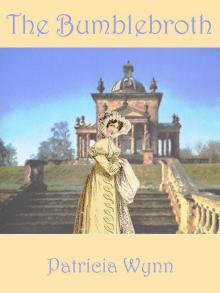 The Bumblebroth
The Bumblebroth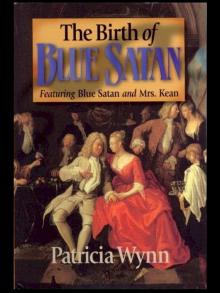 The Birth of Blue Satan
The Birth of Blue Satan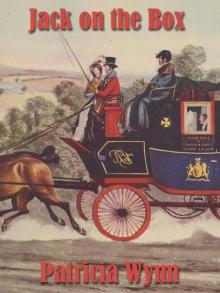 Jack on the Box
Jack on the Box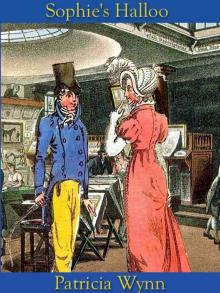 Sophie's Halloo
Sophie's Halloo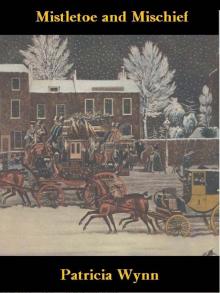 Mistletoe and Mischief
Mistletoe and Mischief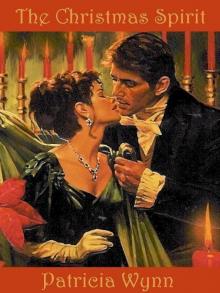 The Christmas Spirit
The Christmas Spirit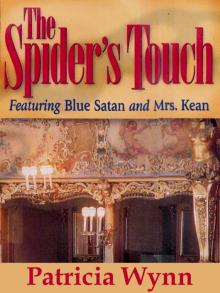 The Spider's Touch
The Spider's Touch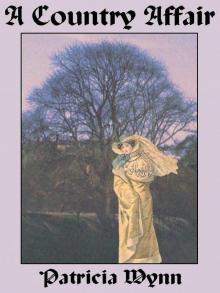 A Country Affair
A Country Affair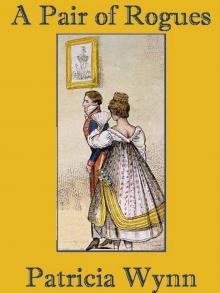 A Pair of Rogues
A Pair of Rogues